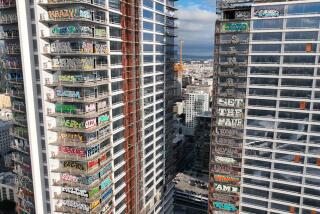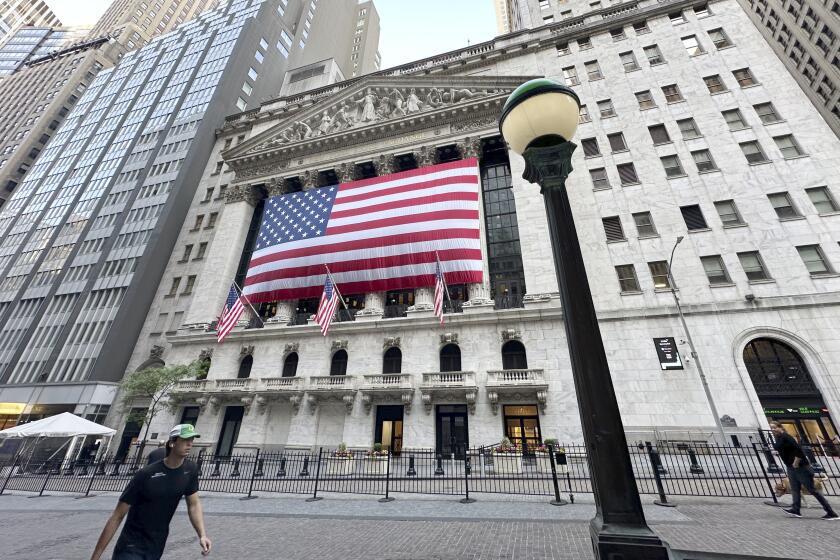For Arab-Americans, Cost of Gulf War Lingers : Discrimination: Hate crimes have subsided and there is no formal boycott, but business people of Mideast descent find customers are scarce.
Some were fire-bombed or harassed when Operation Desert Storm set off a backlash against Arab-Americans, but Majed Tayar was left alone. That’s what’s upsetting him.
Syrian-born Tayar saw his business as a contractor drop off sharply when the war began and he is still waiting for it to snap back.
“You think you’re part of the plain old American public, then you learn otherwise,” said Tayar, a garrulous man who lives in the Bay Ridge section of Brooklyn. “You start feeling like the enemy is all around you. But you don’t know which ones they are.”
The hate crimes against Arab-Americans have subsided since the Persian Gulf War ended but there are many like Tayar who are suffering from the lingering economic effects of the war. Although there is no organized boycott against them, the war made some of their customers hostile and many others uncomfortable enough that they stay away.
This is a problem that these business people do not need in the middle of a recession.
“Arab-Americans in all kinds of business are suffering from this,” said Albert Mokhiber, president of the American-Arab Anti-Defamation Committee, which is meeting here this weekend for its annual convention. “It’s not organized, but it’s everywhere.”
Some Arab-Americans say that they are managing to hold on largely because of continuing trade from longtime customers and contacts within the 3-million-person Arab-American community. Others are trying to conceal their ethnic ties to keep their businesses alive.
A car wash in West Los Angeles, for instance, has tried to surmount the problem by posting a sign saying “Under New Management”--even though the ownership has not really changed, says Nazih Bayda, regional director in Southern California for the Arab-American group.
Some Arab-Americans are changing the names they use for business--from Muhammed to Mike, or from Hussan to Sam, says Bayda. Some fear to speak in Arabic while customers are around.
“It’s pretty terrible when you’re scared to speak a language,” Bayda said.
Last summer, a Sherman Oaks coffee shop owned by a Lebanese-American was defaced with graffiti and burned, an incident investigators ascribed to arson. The restaurant next door, owned by the coffee shop owner’s son, has since suffered a sharp decline in business, says Bayda.
Sometimes customers stay away simply because they feel too much tension. Bayda knows an Arab-American liquor store owner in Los Angeles who is often confronted by his customers with questions.
“They ask: ‘Where are you from?’ ‘Why did you come?’ ‘Do you know our boys fought over there?’ ” Bayda said. “They try to start a political argument, and eventually other people become scared to go in there.”
Professionals report similar problems.
Iraqi-born A. Muhsin Al-Athari survived all sorts of difficult situations before he made it to the United States in 1980.
A lawyer and former member of the Baath Party, he was tried with Saddam Hussein in 1964 for attempting to overthrow the Iraqi government. Both were acquitted.
Now he lives in the Washington area, working as a sole practitioner specializing in international and immigration law. But his practice has been “weak,” he says, and he can understand why.
One of his clients is a Sudanese man, whose son was born in Libya and whose wife is Lebanese. Al-Athari says that he can appreciate why such a person would hesitate to complicate his life by hiring an Iraqi to represent him in this country.
“Consider the situation,” said Al-Athari, who has opposed Saddam Hussein for years but was strongly opposed to America’s involvement in the war because he feared it would destroy Iraq. “No one is trying to push me out of business. But this is terrible.”
The American-Arab Anti-Defamation Committee is citing the difficulties Arab-Americans have suffered to help build a case that Arabs in this country should receive special treatment by the Small Business Administration as disadvantaged minorities. Such status would give them an advantage in applying for federal loans and contracts set aside for minorities, Mokhiber said.
“It should be clearer than ever that we have suffered economic and social discrimination,” he said.







